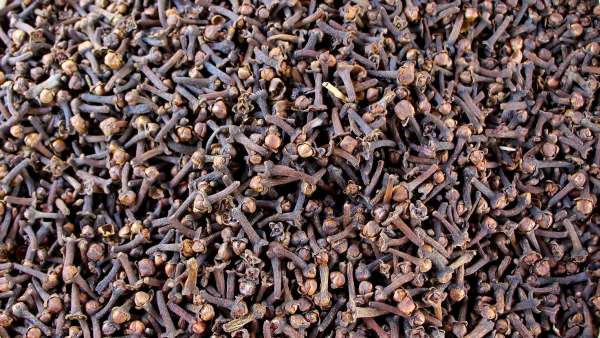Cloves
Nuts and their benefits

Cloves are the dried flower buds of the clove tree, a shrub that can be mistaken for a vine. The buds of this shrub are harvested before they open and are nail-shaped, hence the name.
Cloves are known for their therapeutic effects on the body. The taste of this natural ingredient is mild, spicy-sweet, astringent and very aromatic, and the smell is warm and pungent. Cloves can be a very good substitute for salt, with the power to quench thirst. Cloves are used in the kitchen in some soups, sauces, pastries, some kinds of cakes, mulled wine or tea.
Nutrition facts cloves (100 g):
- Calories: 274 kcal;
- Carbohydrate: 65.53 g;
- Fiber: 33.9 g;
- fructose: 1.07 g;
- Galactose: 0,15 g;
- Carbohydrates / sugars: 2,38 g;
- Glucose/dextrose: 1,14 g;
- Fat 13 g;
- Protein: 5,97 g.
- Choline (vitamin B4): 37.4 mg;
- Vitamin: A, B1, E, B2, B3, B5, K, C, C, B9;
- Calcium: 632 mg;
- Copper: 0.368 mg;
- Iron: 11.83 mg;
- Phosphorus: 104 mg;
- Magnesium: 259 mg;
- Manganese: 60,127 mg;
- Potassium: 1020 mg;
- Selenium: 7.2 µg;
- Sodium: 277 mg;
- Zinc: 2.32 mg;
- Lipids (mono unsaturated, poly unsaturated, trans saturated acids);
- Amino acids.
Benefits of cloves
Since cloves are a natural ingredient with rich nutritional values, they provide countless health benefits, including:
- Cloves improve digestion, reduce flatulence and gastric irritability. When taken in combination with honey, they treat digestive disorders;
- Chemo-preventive and anti-carcinogenic properties. Some tests have shown that regular consumption of cloves can control early-stage lung cancer;
- Cloves have hepato-protective properties, so they protect the liver thanks to their high antioxidant content, which is ideal for protecting internal organs, especially the liver, from the effects of free radicals;
- Cloves keep diabetes under control so that little or no insulin is produced in the body. Some studies have shown that clove extracts mimic insulin in several ways and keep blood glucose levels under control;
- Cloves stimulate the immune system by increasing the number of white blood cells, improving delayed hypersensitivity;
- Anti-inflammatory and analgesic properties;
- Cloves are a very good remedy for oral diseases, so they can be consumed for gum diseases like gingivitis and peridontitis. Extracts from the buds control the growth of oral pathogens responsible for oral diseases. Cloves can be used for toothaches because of their analgesic properties;
- Cloves are a good remedy for headaches. Make a paste from a few cloves and mix with a pinch of crystallized salt. Put the paste in a glass of milk and drink;
- In case of a cold, inhale a few drops of clove oil in boiling water or make a decoction of cloves and inhale the steam;
- For toothaches, crush a clove and put it on the tooth. The anesthetic effect is almost instantaneous - cloves can also be used both as a tooth anesthetic and to disinfect the root canals;
- In case of itchy skin caused by insect bites, mix clove powder with water until a paste is made and apply to the skin.
Contraindications cloves
Although this natural ingredient has countless benefits, it can also have adverse effects on the body.- As for clove essential oil, it is advisable to consult a medical specialist before taking it - the eugenol in it can have a corrosive effect on mucous membranes and can even lead to blood clotting. Some specialists believe that clove oil can cause bleeding in people with bleeding disorders;
- Clove oil capsules should be filtered so they cannot be eroded by gastric juice;
- As for the use of clove oil, it should be diluted with vegetable oil before being applied directly to the skin, as it may cause burns;
- Clove is not recommended for people with blood clotting problems and pregnant women, and overdosage leads to irritation of the central nervous system;
- If surgery is coming up, there is fear that clove oil may cause bleeding during or after an operation. It is recommended to stop taking cloves at least two weeks before a scheduled surgery.
Adverse effects:
- Cloves can be taken orally in amounts commonly found in foods. Oils or creams containing cloves are safe for use when applied directly to the skin. However, applying clove oil to the mouth or gums can sometimes cause damage to the gums, dental pulp, skin and mucous membranes;
- Inhaling smoke from clove-containing cigarettes is harmful and can cause adverse reactions such as respiratory problems and lung disease;
- Dried cloves can cause oral irritation such as damage to dental tissues.
Using cloves
Cloves can be used to flavor rice</b<< and can be used to purify butter. When used in cooking, cloves combine well with nutmeg and cinnamon. In many countries, cloves are used to make perfumes, toothpaste, bath salts and to flavor alcoholic drinks.
They are known to be one of the most powerful disinfectant plants on earth. A single clove put in a stew will extend its shelf life by 24 hours. That's why cloves are recommended and more than that, necessary for preserving almost any food, but also for fighting a multitude of infectious diseases.
Cloves are some of the most prized spices in global gastronomy, having been used for centuries as natural remedies to treat a number of diseases. As we've said before, the secret to cloves' multiple health benefits is eugenol, an active substance that gives them antibiotic, antiviral, antifungal and analgesic qualities. If you want a natural ingredient, a remedy that can help you in the kitchen as well as in the fight against various ailments or illnesses, turn to cloves with confidence.
Comments